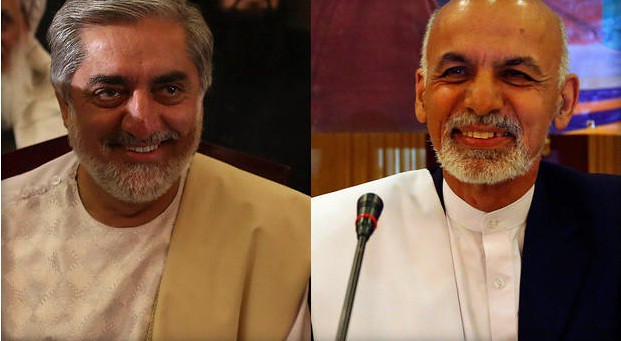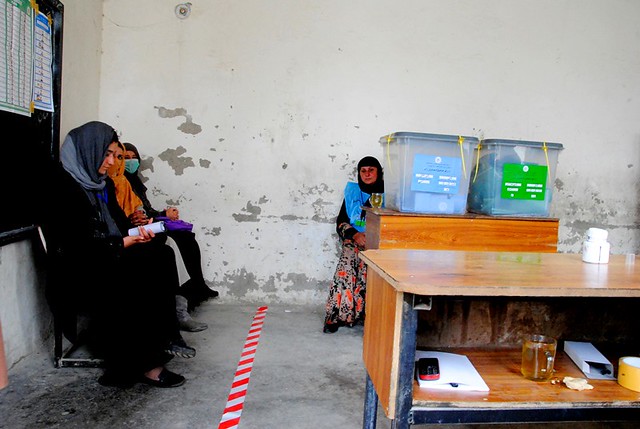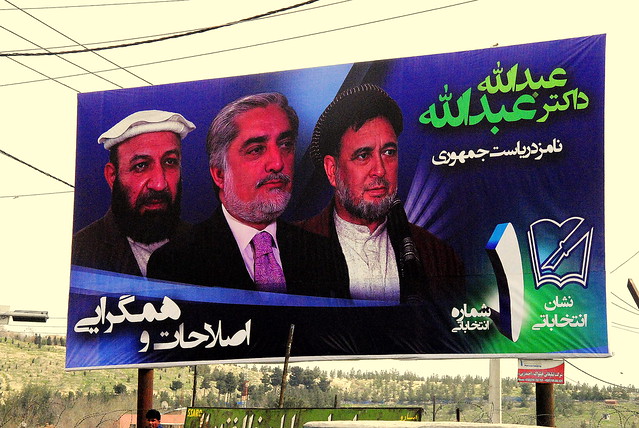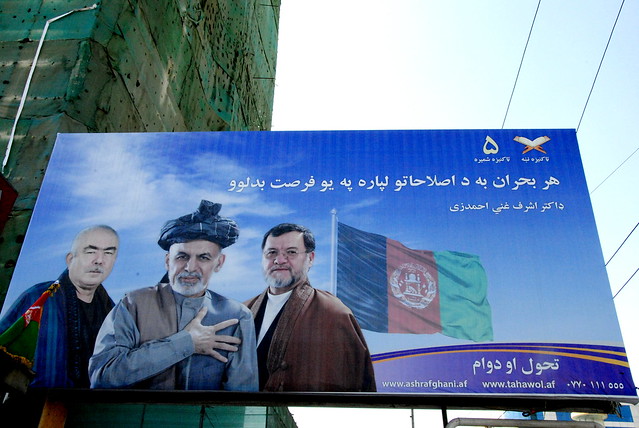By M Reyaz, TwoCircles.net,
Afghanistan is all gear up for the first peaceful transition in over four decades – and in fact first democratic transition in its history – with a “sigh of relief” after months of impasse due to electoral related fraud allegations, and optimism for future amidst mixed reactions for the democratic strides in last 13 years.
The former technocrat turned politician Ashraf Ghani Ahmadzai takes oath as the successor of Hamid Karzai, after a power sharing agreement between him and his opponent Dr Abdullah Abdullah, a doctor by practice and former Northern Alliance leader. According to terms of the agreement – mediated by US Secretary of State John Kerry – they have agreed to form a ‘national unity government’ under which Ghani will serve as the next President, while immediately a new post of Chief Executive Officer (CEO) will be created for the latter, who will serve as a prime minister under him.

Abdullah Abdullah (left) and Ashraf Ghani Ahmadzai. (Courtesy: Reuters/CBS)
Earlier Afghanistan created history by turning out in large number (about 58%) in the April 5 election and later on June 14 run-off, although the allegations of massive fraud had dampened the spirit as people lost hope and blamed the Independent Election Commission as well as politicians for the standoff.
Dr Ashraf Ghani Ahmadzai:
Born in Logar province, 65 year old Ghani is ethnic Pashtun who had his primary education in Kabul after which he shifted to Lebanon where he studied law and political science at Beirut University. He later went to the United States and studied international relations and anthropology and got PhD from the Columbia University.
Ghani who also taught at John Hopkins University in the U.S. and Aarhus University in Denmark and later served as the Chancellor of Kabul University, has co-authored a book on ‘Fixing Failed States: A Framework for Rebuilding a Fractured World’ and wrote another on ‘Strategies For State Building: Confronting The Sovereignty Gap.’ In 2010, Foreign Policy magazine named him as one of the top 100 thinkers in the world and later, in 2013, Prospect magazine too gave him a similar honor.
As I visited Afghanistan during the election campaign, I found that he earned the popularity, particularly among young Pashtuns, for his “intellect and clear vision on policy matters”. Young Afghans were confident he will win the race this time, and deliver in bringing employment for the youth, his prime vote target – in a fashion similar to the election campaign of Indian Prime Minister Narendra Modi.
Ghani has also worked with the World Bank where he served as Chairman of planning and strategy, and was later appointed as advisor to the UN’s Special Representative for Afghanistan, Lakhdar Brahimi. He later served as advisor to the transitional government under Chairman Hamid Karzai; head of the security transition commission; and Finance Minister in 2002-04, but stepped down due to his differences with the President. Ashraf Ghani was also a nominee for the 2009 presidential race, in which he came fourth.
Ghani is married to Rula, a Lebanese national and has one daughter and two sons. He was runner up in the first round of election but clinched victory in the run-off owing to larger consolidation of Pashtun; although the result has been marred in fraud allegations and it will be difficult to know if indeed he had got the majority votes.
As he takes oath as the next President though, Ghani faces an immense challenge of making the national unity government work, which may turn out to be rainbow coalition where once again all major Afghan players will be in the government. The most difficult task he will face is to bury the differences with his rival Abdullah after months of aggressive campaign.
Dr Abdullah Abdullah:
Born to a Pashtun father and Tajik mother, 55 year old Dr Abdullah Abdullah studied in Kabul Medical University and practiced in Kabul, Pakistan and later in Panjshir. He was a close aid of Tajik leader Ahmad Shah Massoud until 1992 and became the spokesperson for the Ministry of Defense during the tenure of Ahmad Shah Massoud as Defense Minister from 1992 to 1996. He later became the Foreign Minister in the short lived Government of Massoud and continued to hold the post in the Northern Alliance Government in ‘exile,’ recognized by India and some other countries.
When the Civil War broke, Abdullah, who has three daughters and one son, shifted his family to New Delhi, where they lived for most part, although he continued to live in Panjshir and later in Kabul. He thus frequently flies to Delhi, and is considered very close to India.

After the NATO troops bombed Taliban out of Kabul and new government under Karzai was installed, he became the Minister of Foreign Affairs but in 2006 resigned due to his differences and contested the Presidential elections in 2009. Abdullah had come second in the 2009 election as well, but withdrew from the run-off few days before the election alleging massive fraud and use of state machinery by President Karzai.
Ambassador Vivek Katju, who worked closely with him during his stint in Kabul, described Abdullah as a suave and pragmatic politician. In fact although accused of arm-twisting during the last few weeks of stalemate, it was largely due to his pragmatism and agreeing to form a coalition government – no doubt under US pressure – that Afghanistan is today witnessing a peaceful and democratic transition.
He feels cheated twice, first in 2009 and this time again, but he agreed to withdraw his claim to presidency and to become a part of the government, under maneuvers and hectic back channel negotiations after Kerry intervened. “When disagreements emerge, it is easy to resort to violence. But there are severe, damaging consequences that the nation would suffer from,” he was quoted as saying by Tolo News, after the announcement of the formation of new government.
Abdullah and Ghani could complement each other in an ideal situation, one a technocrat with immense theoretical knowledge and other who grew and evolved as a politician in the mountains and soil of Afghanistan. Their electoral platforms was largely similar, despite some differences over how to deal with Taliban and system of governance – Abdullah feels that the parliamentary system is more suited to the country’s demography. However, that would have been an ideal situation, and there are apprehensions that the coalition may not hold long as both of them lack the maneuvering tactics that Karzai is said to have possessed, and Ghani is famous for his short temper. The confusion hence may keep some honorable door open for Karzai. In his last address to the nation as President on Sunday night, the outgoing President said, “I will continue to support the next president, government and the constitution.”
Nostalgia for ‘achievements’ of last 13 years:
Although the Karzai era have had mixed results in all fronts, a sort of nostalgia has gripped the people of Afghanistan for what they see as achievements of 13 years. They point to “immense growth” under Karzai.
Afghanistan today does not have a very good track record on any of the internationally measured parameters – it is among the most corrupt countries, one of the unsafest places to be, and Afghans are among the world’s highest number of refugees. Yet considering the fact, that whatever progresses have been made is the result of last 13 years when the Taliban forces were bombed out of Kabul and a new transitional government under Hamid Karzai was installed, the achievements look no mean feat. Kabul today is a bustling young city where men and women are working together in offices.

About 11 million children are today going to schools with overall literacy rate at over 28% (43% male and 12.6% among female). On the streets of Kabul you see girls and boys going to schools without fear and there are no doubt positive changes. Several private universities are mushrooming and that is refection of increasing aspirations of Afghan students.
Millions of students are going to schools, colleges and hundreds of new schools were started. Thousands of students are going abroad for higher studies and have come back to contribute to development of the country.
From a country with hardly a radio channel during the Taliban regime, Afghanistan today has over 75 TV channels, 175 radio and about 800 publications. Afghan media has today become the most independent media in the region and in the history of Afghanistan although it was not only because of Karzai but many donors also helped. But Karzai always stood for media freedom.
With 68% of the people below the age of 30, Afghanistan is a young country with high aspirations and clearly in last 13 years stride they have come a long way and Karzai too had his role. Now that his term is ending, people share nostalgia for him.
Afghanistan is a country that has not seen peaceful transition in over a century or so and till very last there was apprehension if at all President Karzai would side step or “do a Putin,” by assigning some important role for himself after amending the Constitution. Although there are allegations that the post-election stalemate was largely his doing as he wanted to keep his options open, but by stepping down and allowing first peaceful and democratic transition, Karzai has surely won the hearts and minds of his countrymen.

Peaceful and Stable Afghanistan in India’s interest:
Vice President Hamid Ansari is among the audience to see the new President take over. External Affairs Minister Sushma Swaraj recently visited Kabul and reiterated India’s commitment to Afghanistan. “India is prepared to do whatever is possible, within our capacities and our means, to work with the Afghan Government and its peoples to realize this great vision,” she said in Kabul.
India has maintained that a peaceful and stable Afghanistan and region is in its interests. India and Afghanistan share very strong relations and that have further been strengthened by the Strategic Partnership Agreement signed in 2011 between the two countries. The development assistance programme of India of around US 2 billion is a signal of “abiding commitment to peace, stability and prosperity in Afghanistan.”
Post Script: As I visited Afghanistan in March end- April, I heard the gossips of ‘negotiations’ for some kind of ‘unity government’ in all quarters, from people on street to some high officials and politicians, although publicly everyone vehemently denied any such talks right through the electoral process. It comes out at the end that due to electoral impasse, indeed a national unity government appeared to be the only viable option.
(M Reyaz is a Research Scholar on Central Asia and was in Afghanistan during the Presidential Election campaign. He tweets at @journalistreyaz)

